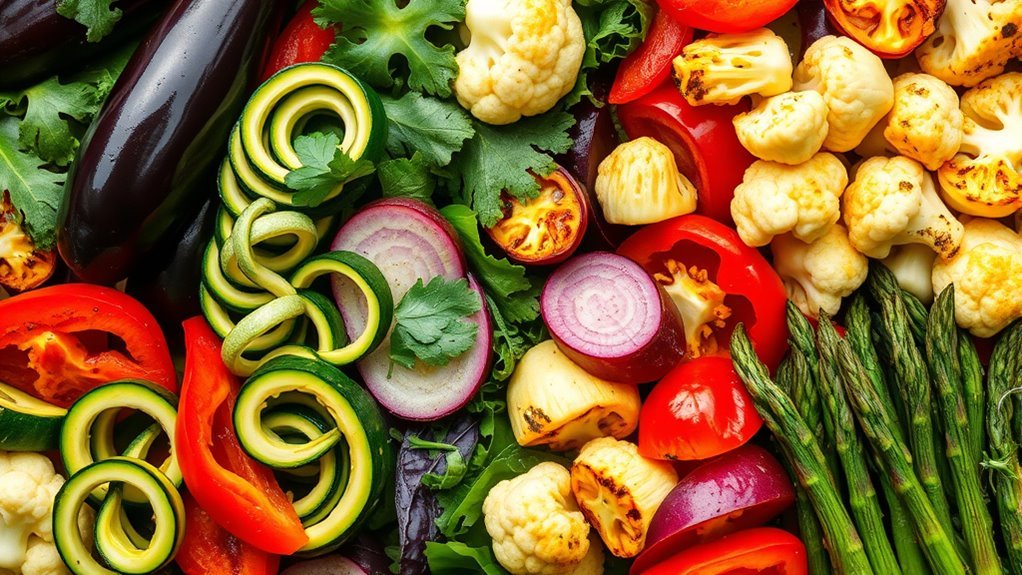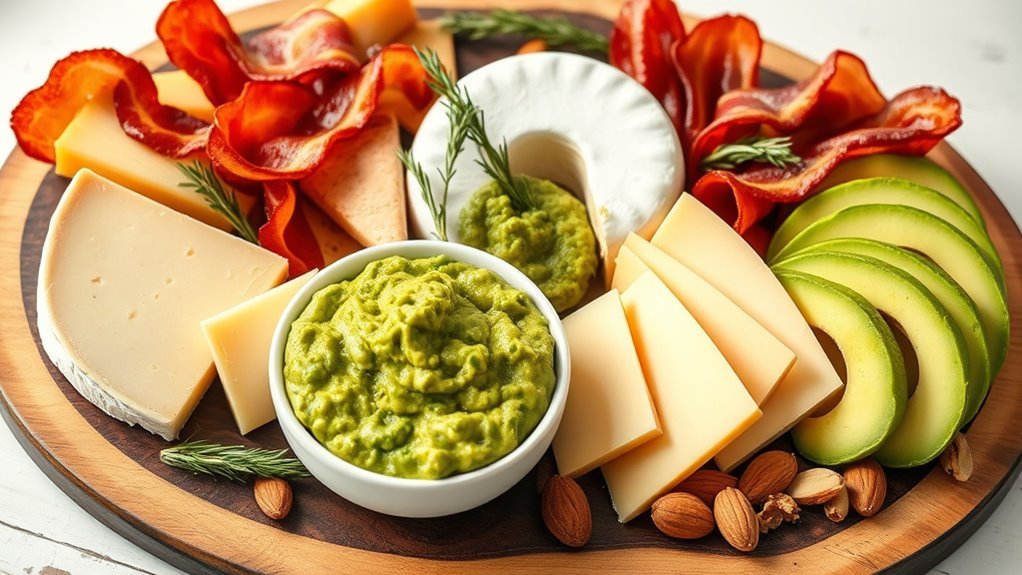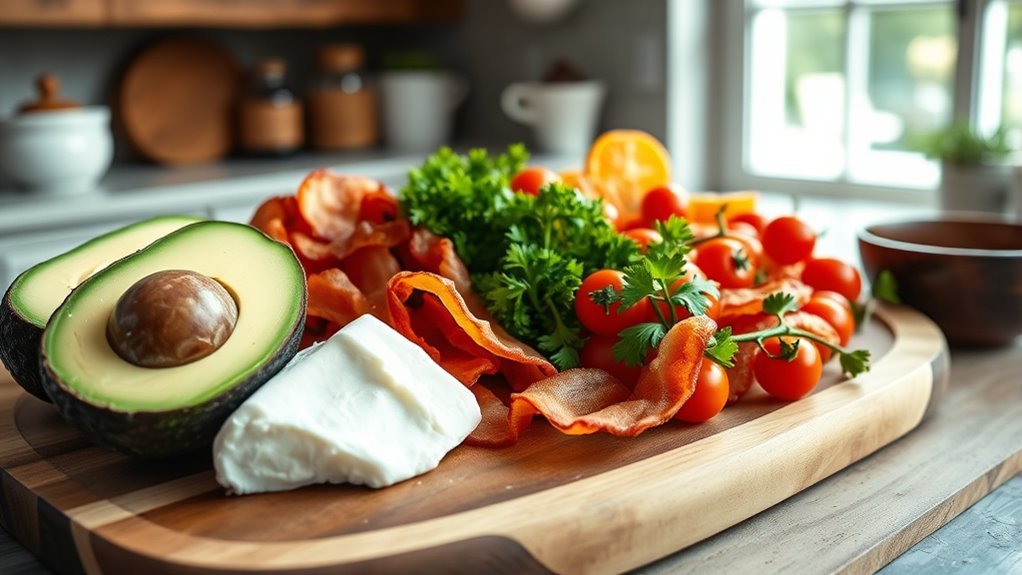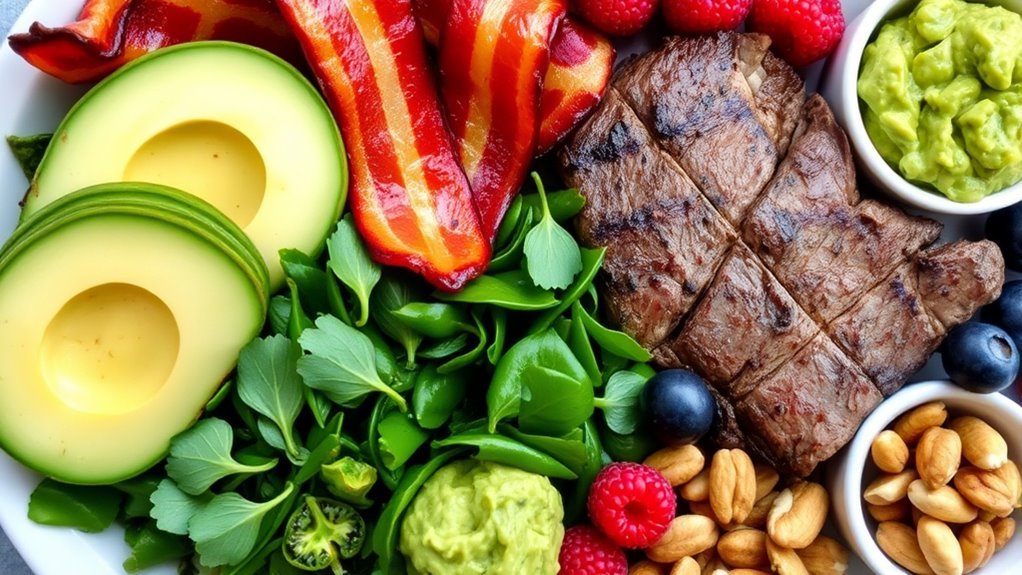On the keto diet, you can enjoy a variety of whole foods that are low in carbs and high in healthy fats. Incorporate low-carb vegetables like spinach and broccoli, high-fat dairy products such as cheese and cream, and protein sources like chicken and tofu. Healthy fats from avocados and olive oil are essential too. Don’t forget keto-friendly snacks like nuts and seeds, which boost flavor while keeping carbs in check. Explore more options to optimize your keto journey.
Low-Carb Vegetables

When it comes to the keto diet, low-carb vegetables are essential allies in your nutritional journey. They provide crucial nutrients while keeping your carb intake in check. Popular keto vegetable options include leafy greens like spinach and kale, cruciferous vegetables such as broccoli and cauliflower, and other low-carb choices like zucchini and bell peppers. Incorporating these veggies into your meals not only enhances flavor but also boosts fiber intake, which can improve digestion. You can easily whip up delicious low carb salads featuring these ingredients, ensuring you stay satisfied without derailing your diet. By prioritizing these low-carb vegetables, you empower yourself to enjoy a diverse and nutritious diet while maintaining ketosis.
High-Fat Dairy Products

Incorporating low-carb vegetables into your keto diet sets the stage for adding high-fat dairy products, which can play a significant role in meeting your macronutrient goals. High-fat dairy, like cheese varieties and cream options, not only enhance flavor but also provide essential fats that keep you satiated. Cheeses such as cheddar, mozzarella, and cream cheese are excellent choices, as they’re low in carbs and rich in nutrients. Cream options, including heavy cream and sour cream, can elevate dishes while contributing healthy fats. When choosing dairy, opt for full-fat versions to maximize your keto benefits. Remember, moderation is key, and balancing your intake with other food groups will help you maintain peak health on your keto journey.
Protein Sources

While you might think a low-carb diet limits your options, the keto diet offers a variety of protein sources that can enhance your meals and support muscle health. Lean meats, such as chicken, turkey, and grass-fed beef, are excellent choices. They provide essential amino acids while keeping your carb intake low. For those seeking plant proteins, options like tofu, tempeh, and seitan can fit well into your diet. These sources offer both protein and healthy nutrients. Incorporating a mix of these proteins not only diversifies your meals but also guarantees you get a well-rounded nutrient profile. By focusing on these lean meats and plant proteins, you can maintain your energy levels and promote muscle recovery, all while enjoying the freedom of diverse dining options.
Healthy Fats and Oils
Understanding the types of healthy fats and oils is vital for optimizing your keto diet. You’ll want to focus on sources like avocados, olive oil, and nuts, which provide essential nutrients while promoting heart health. Additionally, practicing portion control guarantees you’re meeting your dietary goals without overconsumption, which can hinder your progress.
Types of Healthy Fats
When it comes to the keto diet, recognizing the types of healthy fats is essential for achieving ideal results. Including the right fats can enhance your health and support your weight loss journey. Here are some key healthy fats to evaluate:
- Avocado: Packed with nutrients, the avocado benefits your heart and enhances satiety.
- Olive Oil: Rich in monounsaturated fats, it’s great for cooking and salad dressings.
- Coconut Oil: Contains medium-chain triglycerides that boost energy and metabolism.
- Grass-fed Butter: Offers vitamins and healthy fats, making it a great addition to meals.
- Nuts and Seeds: Provide essential fatty acids and protein, ideal for snacking.
Embracing these fats can empower you on your keto journey, giving you the freedom to enjoy delicious, satisfying meals.
Cooking Oils to Use
Choosing the right cooking oils is essential for anyone following a keto diet, as they not only contribute to the flavor of your meals but also impact your overall health. Olive oil benefits include its rich monounsaturated fats, which can support heart health and reduce inflammation. On the other hand, coconut oil uses range from cooking to baking, providing a source of medium-chain triglycerides (MCTs) that can promote ketone production.
| Oil Type | Benefits | Best Uses |
|---|---|---|
| Olive Oil | Heart health, anti-inflammatory | Salad dressings, sautéing |
| Coconut Oil | MCTs, potential weight loss | Baking, frying |
| Avocado Oil | High smoke point, nutrients | Grilling, drizzling |
| Flaxseed Oil | Omega-3 fatty acids | Smoothies, dressings |
Portion Control Tips
Maintaining portion control while incorporating healthy fats and oils into your keto diet can greatly influence your progress and overall well-being. By practicing mindful meal planning and understanding serving sizes, you can enjoy the freedom of a satisfying diet without overindulging. Here are some tips to help you balance your fat intake:
- Measure out serving sizes to avoid guesswork.
- Use smaller plates to create an illusion of fullness.
- Include a variety of healthy fats to keep meals interesting.
- Track your intake with apps for accountability.
- Be mindful of hidden fats in sauces and dressings.
These strategies can help you stay on track, ensuring that you reap the benefits of healthy fats while maintaining your keto lifestyle effectively.
Nuts and Seeds
While incorporating nuts and seeds into your keto diet can enhance both flavor and nutrition, it’s essential to choose the right varieties to maintain your desired macronutrient balance. For ideal health benefits, focus on low-carb nut varieties like macadamias, pecans, and Brazil nuts, which provide healthy fats without excessive carbohydrates. Seeds like chia, flax, and pumpkin are excellent additions too, as they offer significant fiber and essential nutrients while keeping carbs in check. The seed benefits include omega-3 fatty acids and antioxidants, which support overall well-being. By selecting the right nuts and seeds, you can enjoy satisfying snacks that align with your keto goals, allowing for both freedom and mindful eating in your daily routine.
Keto-Friendly Snacks
Nuts and seeds are just the beginning when it comes to satisfying your cravings on a keto diet. Embrace the freedom of variety with these delicious keto-friendly snacks that won’t derail your progress. Consider adding these tasty options to your routine:
- Cheese crisps for a crunchy delight
- Avocado slices paired with keto-friendly dips
- Pork rinds for a savory crunch
- Celery sticks filled with cream cheese
- Hard-boiled eggs for a protein-packed treat
These portable snacks are perfect for on-the-go lifestyles, ensuring you stay on track without sacrificing flavor. Remember, the key to success is finding snacks that satisfy your cravings while keeping you within your carb limits. Enjoy the journey to a healthier you!
Frequently Asked Questions about Keto Diet Foods
1. What foods can I eat on a keto diet?
On a keto diet, you can eat a variety of foods that are high in healthy fats, moderate in protein, and low in carbohydrates. This includes foods like avocados, nuts, seeds, olive oil, fatty fish (such as salmon and mackerel), eggs, and low-carb vegetables (like spinach, kale, and broccoli). Dairy products such as cheese and full-fat yogurt are also included, as well as meats like beef, pork, and poultry. It’s important to avoid high-carb foods like grains, sugar, and starchy vegetables.
2. Can I eat fruits on a keto diet?
While fruits are generally healthy, many are high in carbohydrates and sugars, which can hinder ketosis. However, you can enjoy certain low-carb fruits in moderation, such as berries (strawberries, raspberries, and blackberries), melons, and avocados. It’s advisable to keep track of your carb intake and choose fruits that align with your daily carb goals.
3. Are there any snacks suitable for a keto diet?
Yes! There are several keto-friendly snacks you can enjoy. Some popular options include nuts and seeds, cheese, hard-boiled eggs, beef jerky (make sure it’s low-carb), and vegetable sticks with dip (like guacamole or cream cheese). You can also find many keto snack products available on the market, such as protein bars and chips made from cheese or nuts.
4. Can I drink alcohol on a keto diet?
Alcohol can be consumed on a keto diet, but you should choose wisely. Low-carb options include spirits like whiskey, vodka, gin, and tequila, which have little to no carbs. Dry wines (especially red and white) are also lower in carbs compared to sweet wines and cocktails. However, it’s crucial to monitor your intake since alcohol can affect ketosis and may lead to increased appetite.
5. What are some common mistakes to avoid on a keto diet?
Some common mistakes on a keto diet include not tracking carbohydrate intake accurately, consuming hidden sugars in processed foods, neglecting to eat enough fats, and not drinking enough water or electrolytes. It’s also important to ensure you’re getting a variety of nutrients, so avoid eating the same foods repeatedly. Additionally, be cautious of “keto-friendly” products that may still contain higher carbs than you realize.
References
- https://www.healthline.com/nutrition/keto-diet-foods
- https://www.ncbi.nlm.nih.gov/pmc/articles/PMC5553339/
- https://www.webmd.com/diet/what-is-the-keto-diet
- https://www.mayoclinic.org/healthy-lifestyle/nutrition-and-healthy-eating/expert-answers/keto-diet/faq-20488173
- https://www.cdc.gov/healthyweight/healthy_eating/dietary_guidelines.html
- https://www.dietitians.ca/Downloads/Public/dietary-approaches-to-stop-hypertension-dash-and-keto-diet.aspx


